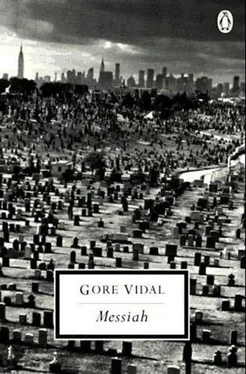Gore Vidal - Messiah
Здесь есть возможность читать онлайн «Gore Vidal - Messiah» весь текст электронной книги совершенно бесплатно (целиком полную версию без сокращений). В некоторых случаях можно слушать аудио, скачать через торрент в формате fb2 и присутствует краткое содержание. Жанр: Современная проза, на английском языке. Описание произведения, (предисловие) а так же отзывы посетителей доступны на портале библиотеки ЛибКат.
- Название:Messiah
- Автор:
- Жанр:
- Год:неизвестен
- ISBN:нет данных
- Рейтинг книги:3 / 5. Голосов: 1
-
Избранное:Добавить в избранное
- Отзывы:
-
Ваша оценка:
- 60
- 1
- 2
- 3
- 4
- 5
Messiah: краткое содержание, описание и аннотация
Предлагаем к чтению аннотацию, описание, краткое содержание или предисловие (зависит от того, что написал сам автор книги «Messiah»). Если вы не нашли необходимую информацию о книге — напишите в комментариях, мы постараемся отыскать её.
Messiah — читать онлайн бесплатно полную книгу (весь текст) целиком
Ниже представлен текст книги, разбитый по страницам. Система сохранения места последней прочитанной страницы, позволяет с удобством читать онлайн бесплатно книгу «Messiah», без необходимости каждый раз заново искать на чём Вы остановились. Поставьте закладку, и сможете в любой момент перейти на страницу, на которой закончили чтение.
Интервал:
Закладка:
To behold the inexplicable was perhaps the most unpleasant experience a human being of that age could know, and during that gaudy decade many wild phenomena were sighted and recorded.
In daylight, glittering objects of bright silver maneuvered at unearthly speed over Washington, D. C., observed by hundreds, some few reliable. The government, with an air of spurious calm, mentioned weather balloons, atmospheric rejections, tricks-of-eye, hinting, to, as broadly as it dared, that a sizable minority of its citizens were probably subject to delusions and mass hysteria. This cynical view was prevalent inside the administration though it could not of course propound such a theory publicly since its own tenure was based, more or less solidly, on the franchise of those same hysterics and irresponsibles.
Shortly after the mid-point of the century, the wonders increased, becoming daily more bizarre. The recent advance in atomic research and in jet-propulsion had made the Western world disagreeably aware of other planets and galaxies and the thought that we would soon be making expeditions into space was disquieting, if splendid, giving rise to the not illogical thought that life might be developing on other worlds somewhat more brilliantly than here at home and, further, that it was quite conceivable that we ourselves might receive visitors long before our own adventuring had begun in the starry blackness which contains our life, like a speck of phosphorus in a quiet sea. And since our people were (and no doubt still are) barbarous and drenched in superstition, like the dripping "Saved" at an old-time Texas baptism, it was generally felt that these odd creatures whose shining cars flashed through our poor heavens at such speed must, of necessity, be hostile and cruel and bent on world dominion, just like ourselves or at least our geographic neighbors.
The evidence was horrific and plentiful: In Berlin a flying object of unfamiliar design was seen to land by an old farmer who was so close to it that he could make out several little men twinkling behind an arc of windows. He fled, however, before they could eat him. Shortly after his breathless announcement to the newspapers, he was absorbed by an Asiatic government whose destiny it was at that time to regularize the part of humanity fortunate enough to live within its curiously elastic boundaries, both temporal and spiritual.
In West Virginia, a creature ten feet tall, green with a red face and exuding a ghastly odor, was seen to stagger out of a luminous globe, temporarily grounded. He was observed by a woman and four boys, all of unquestionable probity; they fled before he could eat them. Later, in the company of sheriff and well-armed posse, they returned to the scene of horror only to find both monster and conveyance gone: but even the skeptical sheriff and his men could detect, quite plainly, an unfamiliar odor, sharp and sickening among the clean pines.
This particular story was unique because it was the first to describe a visitor as being larger instead of smaller than a man, a significant proof of the growing anxiety: we could handle even the cleverest little creature but something huge, and green, with an awful odor… it was too much.
I myself, late one night in July of the mid-century, saw quite plainly from the eastern bank of the Hudson River where I lived, two red globes flickering in a cloudless sky. As I watched, one moved to a higher point at a forty-five-degree angle above the original plane which had contained them both. For several nights I watched these eccentric twins but then, carried away by enthusiasm, I began to confuse Mars and Saturn with my magic lights until at last I thought it wise to remain indoors, except for those brief days at summer's end when I watched, as I always used to do, the lovely sudden silver arcs meteors plunging make.
In later years, I learned that, concurrently with the celestial marvels, farm communities were reporting an unusual number of calves born two-headed, chickens hatched three-legged, and lambs born with human faces; but since the somewhat vague laws of mutation were more or less well understood by the farmers these curiosities did not alarm them: an earlier generation, however, would have known, instinctively, that so many irregularities forecast an ill future, full of spite.
Eventually, all was satisfactorily explained or, quite as good, forgotten. Yet the real significance of these portents was not so much in the fact of their mysterious reality as in the profound effect they had upon a people who, despite their emphatic materialism, were as easily shattered by the unexpected as their ancestors who had, on other occasions, beheld eagles circling Capitoline Hill, observed the sky grow leaden on Golgotha, shivered in loud storms when the rain was red as blood and the wind full of toads, while in our own century, attended by a statesman-Pope, the sun did a dance over Portugal.
Considering the unmistakable nature of these signs, it is curious how few suspected the truth: that a new mission had been conceived out of the race's need, the hour of its birth already determined by a conjunction of terrible new stars. It is true of course that the established churches duly noted these spectacular happenings and, rather slyly, used them to enhance that abstract power from which their own mystical but vigorous authority was descended. The more secular, if no less mystical, dogmas… descended variously from an ill-tempered social philosopher of the nineteenth century and an energetic, unreasonably confident mental therapist, also a product of that century's decline… maintained, in the one case, that fireworks had been set off by vindictive employers to bedazzle the poor workers for undefined but patently wicked ends, and, in the other case, that the fiery objects represented a kind of atavistic recessional to the childish world of marvels; a theory which was developed even further in a widely quoted paper by an ingenious disciple of the dead therapist. According to this worthy, the universe was the womb in symbol and the blazing lights which many people thought they saw were only a form of hallucination, harking back to some prenatal memory of ovaries bursting with a hostile potential life which would, in time, become sibling rivals. The writer demanded that the government place all who had seen flying objects under three years' close observation to determine to what extent sibling rivalry, or the absence of it (the proposition worked equally well either way) had affected them in life.
Although this bold synthesis was universally admired and subsequently read into the Congressional Record by a lady Representative who had herself undergone nine years' analysis with striking results, the government refused to act.
3
But although nearly every human institution took cognizance of these signs and auguries, none guessed the truth, and those few individuals who had begun to suspect what might be happening preferred not to speak out; if only because, despite much private analysis and self-questioning, it was not a time in which to circulate ideas which might prove disagreeable to any minority, no matter how lunatic. The body politic was more than usually upset by signs of non-conformity. The atmosphere was not unlike that of Britain during the mad hour of Titus Oates.
Precisely why my countrymen behaved so frantically is a problem for those historians used to the grand, eternal view of human events. I have often thought, though, that much of our national irritability was closely related to the unexpected and reluctant custody of the world the second war had pressed upon the confused grandchildren of a proud, agrarian, isolated people, both indifferent and strange to the ways of other cultures.
Читать дальшеИнтервал:
Закладка:
Похожие книги на «Messiah»
Представляем Вашему вниманию похожие книги на «Messiah» списком для выбора. Мы отобрали схожую по названию и смыслу литературу в надежде предоставить читателям больше вариантов отыскать новые, интересные, ещё непрочитанные произведения.
Обсуждение, отзывы о книге «Messiah» и просто собственные мнения читателей. Оставьте ваши комментарии, напишите, что Вы думаете о произведении, его смысле или главных героях. Укажите что конкретно понравилось, а что нет, и почему Вы так считаете.












